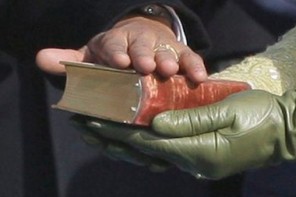There are two competing narratives currently operative in this slowly-simmering presidential campaign season. For reasons that are worthy of investigation in their own right, only Senator Obama has been forced to speak to them explicitly thus far. The field of potential presidents has now been reduced to three—three Senators, from three very different regions of the United States. None of them are particularly confessional in religious terms. Yet religion has continually resurfaced in the context of the Obama campaign. And in every case, questions of his religiosity have been linked to questions about his patriotism. It has been rumored that he is a Muslim. It has been rumored that he will not salute the flag for religious reasons, and will not wear a flag on his lapel either. It has been rumored that he secretly endorses the most vehement and separatist ideas of his former pastor. And so on.
The real question behind all of these questions is what the relationship between religious belief and democratic politics ought to be. And how should the religiosity of a potential president factor in the electorate’s decision-making? Just beneath that question, it seems to me, is an implicit historical narrative, a narrative that hearkens back to the golden age of the nation’s founding and the alleged religiosity of her first presidents. But what, we would do well to wonder, was the religious affiliation of the Founders?
Clearly, they were a ragbag bunch: Deists like Thomas Jefferson felt free to edit and rewrite the Bible to serve their own rationalist tastes, or Thomas Paine who insisted that the “rights of man” did not have and did not need to have any supernatural foundation. There were many tradition-minded Protestants in the mix as well, but given the fact of the religious diversity within the original thirteen or fourteen colonies (Nova Scotia was a puzzler, but eventually sided with the royalists and thus stayed out of the Revolution), the Founders felt it was important to sideline religion as a factor in questions of eligibility for office or for citizenship. An atheist in the United States, they believed, had to have the same rights, and for the same democratic reasons, as an evangelical Christian had.
There is an alternative story of the nation’s founding, one at odds with the historical facts but nonetheless resurgent and quite potent as a focus for contemporary nostalgia and more. Ever since the Pilgrims landed at Plymouth, it is alleged, this country’s Founders were, all of them, deeply and abidingly religious men who understood that the rights of man have a supernatural foundation and logic, or else they cannot be secured. This story continues by insisting that religion was gradually taken out of the nation’s democratic and civic structures and that it needs to be brought back now.
This story falsifies the record in several important ways. And I think no better symbol of this narrative slippage can be found than in the matter of oaths of office, the question of that to which public officials are forced to swear when they swear in. It is easy to forget how “sacred” the concept of liberty of conscience was to the Founders. Liberty of conscience meant just that: each and every citizen’s freedom to make up his or her own mind on matters of ultimate significance, the right of an individual to declare as a Christian, a Buddhist, an atheist, or what have you, without suffering civic consequences. In such a country, to what may a newly-elected president swear?
Article II, Section 1 of the US Constitution lays out exactly what oath the newly elected President is supposed to swear. It goes like this:
I do solemnly swear (or affirm) that I will faithfully execute the office of President of the United States, and will to the best of my ability preserve, protect, and defend the Constitution of the United States.
That’s all. No mention of God, no mention of anything more than the individual conscience. The power of such conscience, and the virtues this presupposes, were believed to be enough. In short, the Founders were as vigilant about keeping invocations of “God” out of our public civic discourse as the current fashion, in both parties, is to drag it in. As North American sociologist Robert Bellah made clear in an important essay on “American Civil Religion,” the first president to use the word “God” in an Inaugural Address was James Madison, in 1821. Which is to say, the country was more than thirty years old before a US President dared to invoke “God” outright at such a civic ceremony.
This was a maverick nation and the founders were, a great many of them, religious mavericks as well. There is a proud tradition which runs through Emerson’s Harvard Divinity Address, Thoreau’s essays on Civil Disobedience, Whitman’s Democratic Vistas—one that holds up religious heterodoxy as the very engine driving the new Republic, freedom of conscience as the very pulse-beat of her new traditions of innovation.
Several years ago, I was called before a local magistrate to give testimony. The Judge asked me to raise my right hand and said, “Do you swear to tell the truth, the whole truth and nothing but the truth, so help you?” I waited a moment for the next word. But it never came.
It is only now that I see the importance of that omission, which was no omission at all. Freedom of conscience cannot be forced to say more; it need not say more.




